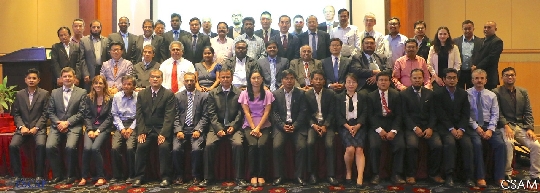UN meeting develops common regional testing standards for sustainable agricultural mechanization

Penang, Malaysia (ESCAP news) – Experts from the Asia-Pacific region developed technical requirements for common regional testing standards for sustainable agricultural mechanization at the 4th Meeting of the Technical Working Groups of the Asian and Pacific Network for Testing of Agricultural Machinery (ANTAM), which took place in Georgetown from 25 to 28 June 2018.
Organized by the Centre for Sustainable Agricultural Mechanization (CSAM) of the United Nations Economic and Social Commission for Asia and the Pacific (ESCAP), in collaboration with the Institution of Engineers Malaysia (IEM), the meeting provided testing engineers with a platform to access inputs from private sector representatives, researchers and experts from the Food and Agriculture Organization (FAO).
Participants at the meeting also reviewed and updated ANTAM testing Codes for Power Tillers, Sprayers and Paddy Transplanters. The improved Codes reflect the evolving demands of member countries and respond to the needs of national agricultural machinery testing stations.
Commenting on the meeting, Head of CSAM Dr. Yutong Li said, “CSAM has been working dedicatedly to support regional integration through South-South and Triangular Cooperation. Our commitment to harmonize the trade of agricultural machinery through the development of mutually-recognized regional testing standards supports the vision of the 2030 Agenda for Sustainable Development to integrate the economic, social and environmental dimensions of development and realize our shared commitment to leave no one behind.”
Efficient and appropriate use of agricultural mechanization technology plays a crucial role in doubling agricultural productivity and income of small-scale farmers and ensuring sustainable food production.
A CSAM-led initiative, the ANTAM Codes for testing agricultural machinery are developed through a participatory approach to harmonize national testing practices on safety, efficiency and environmental standards into one regional standard. Such development is crucial to the sustainable development of agriculture in the region as it not only facilitates trade and investment in the sector, but also contributes to the creation of a safer, friendlier, and more cost-effective working environment for farmers.
During the meeting, participants also visited the Rice Centre of Excellence (RiCE) of the Malaysian Agricultural Research and Development Institute (MARDI) to foster knowledge exchange on best practices in the region.
For more information visit: http://antam.un-csam.org/
